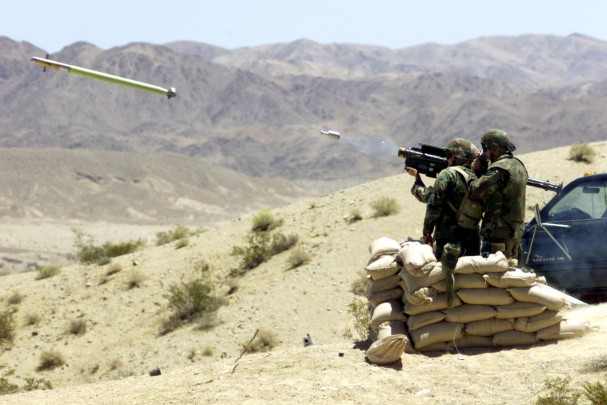
From Kimberly Dozier and Bradley Klapper, the AP: It’s a polite faceoff of spies vs. diplomats, as the Obama administration debates how aggressively to pursue Libya’s vast weapons stores, including tons of caustic mustard agent and thousands of anti-aircraft rockets that experts fear could fall into the hands of terrorists or Libyan loyalists.
The State Department wants to wait for fighting to abate before moving throughout Libya to locate and secure fugitive leader Moammar Gadhafi‘s massive weapons stores, according to two U.S. officials. It’s also stressing working through the nascent Libyan rebel government.
Some U.S. intelligence officials have been pushing to expand the CIA’s role in Libya to track down the weaponry faster, unilaterally without the rebels’ help if necessary. They fear the rockets in particular may be quickly sold, ending up with al-Qaida or fueling a Libyan insurgency for years to come, the officials say.
Already, the prices of the shoulder-launched missiles called MANPADs have fallen on the regional black market, the officials say, suggesting some of Gadhafi’s stores are already being sold. . . .
The White House has resisted calls to expand the CIA’s covert mission, just as it has ruled out deploying U.S. troops on the ground in Libya, one current and one former U.S. official said. The administration is pushing instead for other NATO partners to step in and take up the hunt.
A senior administration official who has been privy to discussions about finding Gadhafi’s weapons said State Department and CIA officials have been working closely on the matter and that no such disagreements about strategy have been aired.
The State Department expressed confidence Thursday that Libya’s raw nuclear material and the deadly chemicals are secure, though State Department spokeswoman Victoria Nuland acknowledged the fate of the thousands of rockets and conventional weaponry is less clear. . . .
The State Department has spent $3 million on two international weapons teams to locate and destroy such systems in rebel-held parts of the country. The teams have demolished nearly 30 Russian SA-7 launchers, according to Alexander Griffiths, director of operations for the Swiss Foundation for Mine Action, one of the weapons abatement groups. But they are only scouring rebel-held battle sites and arms depots and are not sent into combat hot zones. (photo: Department of Defense)
Image: dod%208%2027%2011%20Manpad.jpg
